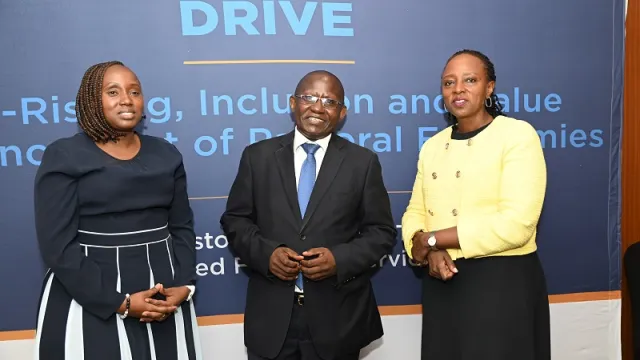Kenya's Sh20 billion plan to cushion pastoralists against drought losses

Kenya's Sh20 billion plan to cushion pastoralists against drought losses
Thousands of pastoralists in Kenya’s arid and semi-arid counties are set to benefit from a World Bank-backed $140 million (about Kes20 billion) animal insurance and market enhancement scheme that will cushion them against losses attributable death of livestock due to drought and climate change-related issues.
The plan, De-Risking, Inclusion and Value Enhancement (DRIVE), is a collaboration between Kenya's State Department for Livestock Development, regional insurance ZEP-RE (PTA Reinsurance Company), the Kenya Development Corporation (KDC) and the World Bank Group.
DRIVE will be replacing an earlier livestock insurance scheme, the Kenya Livestock Insurance Program (KLIP), which was in place between 2015 and 2021.
A total of 250,000 households spread across 21 counties in Kenya are set to benefit from the five-year programme that also seeks to cover Djibouti, Ethiopia and Somalia under the guidance of the African Union.
The benefiting counties are: Turkana, Marsabit, Mandera, Wajir, Garissa, Tana River, Isiolo, Samburu, Meru, Tharaka Nithi, Baringo, West Pokot, Narok, Laikipia, Kajiado, Makueni, Kitui, Lamu, Taita Taveta, Kilifi and Kwale.
According to the National Drought Management Authority, the current severe drought has left a trail of devastation in pastoralist communities with 2.6 million heads of animals reported dead due to lack of water and pasture.
The project has two components, the first being a move to reducing the risks in livestock keeping business by offering the financial services which ZEP-RE (a PTA Reinsurance Company), the regional implementing agent, will deliver in collaboration with the government.
"ZEP-RE is particularly keen to ensure equity empowerment of pastoral communities by focusing on innovating how women, youth, and people with disability would also access financial services and linkages to markets and trade-related opportunities under component two. We look forward to scaling financial packages that support the resilience of the communities against various shocks,” Hope Murera, Managing Director and CEO, ZEP-RE (PTA Reinsurance Company) said.
Read: Fighting climate change with native tree species
The focus will be protecting pastoralists against recurring drought shocks through the rollout of a myriad of financial literacy services including drought index insurance, savings, and digital accounts.
The exercise is billed to provide the pastoralists with more reliable market information, ensuring farmers earn well from their activities.
The second component with an allocated budget of $65 million will guarantee the pastoralists get better value for their livestock by creating markets around the livestock value chain and upgrading standards and equipment to check the conformity of livestock and livestock products to international standards.
The implementing agent for this component will be the Kenya Development Corporation(KDC) and State Department for Livestock Development (SDLD).
“The project expands access of pastoralists to a package of financial services, so that they may receive insurance payouts in their accounts in case of severe drought and use their savings in case of moderate shocks,” said Keith Hansen, the World Bank Country Director.
“It aims to provide pastoralists with reliable livestock markets where they get better value for their livestock by selling more regularly and directly to the livestock processors and exporters. This financial protection against drought frees pastoralists from keeping many animals to protect themselves against drought shocks."



